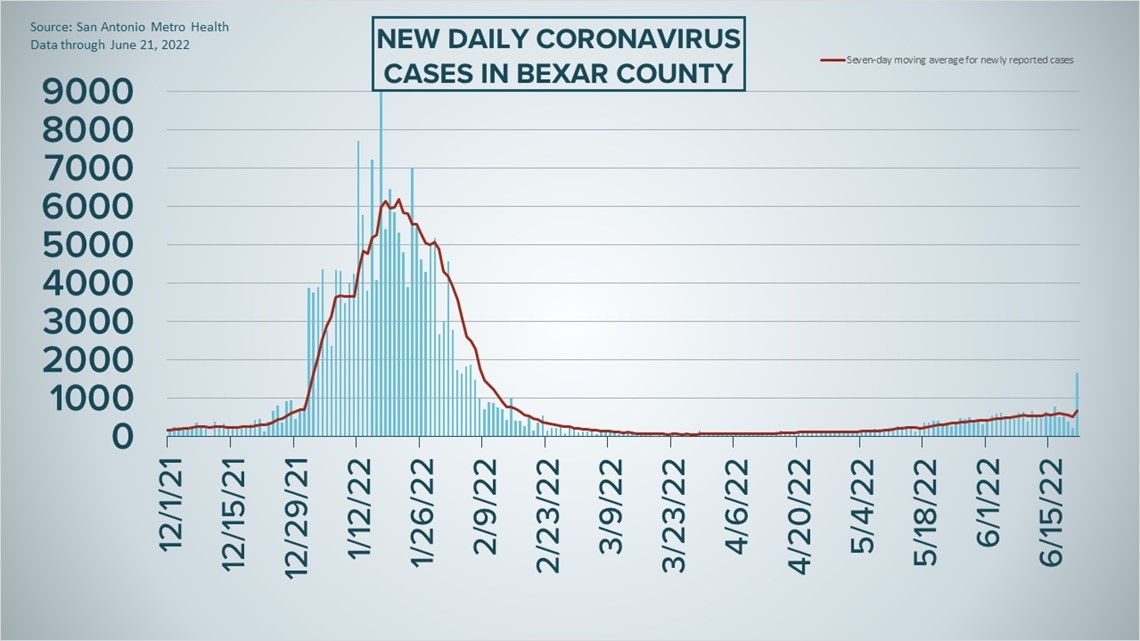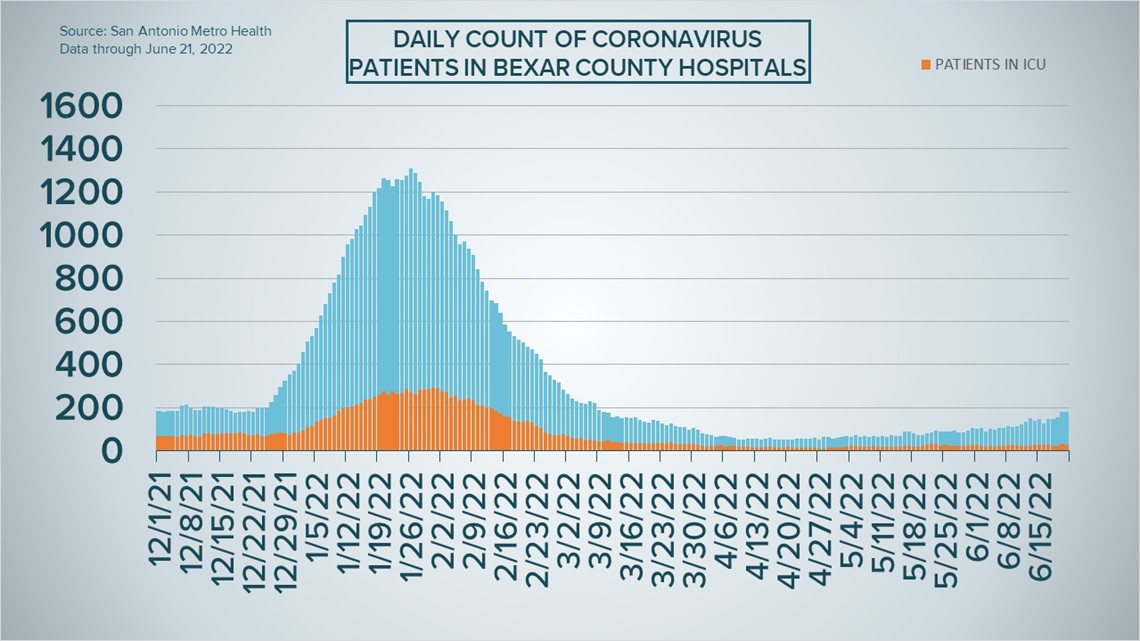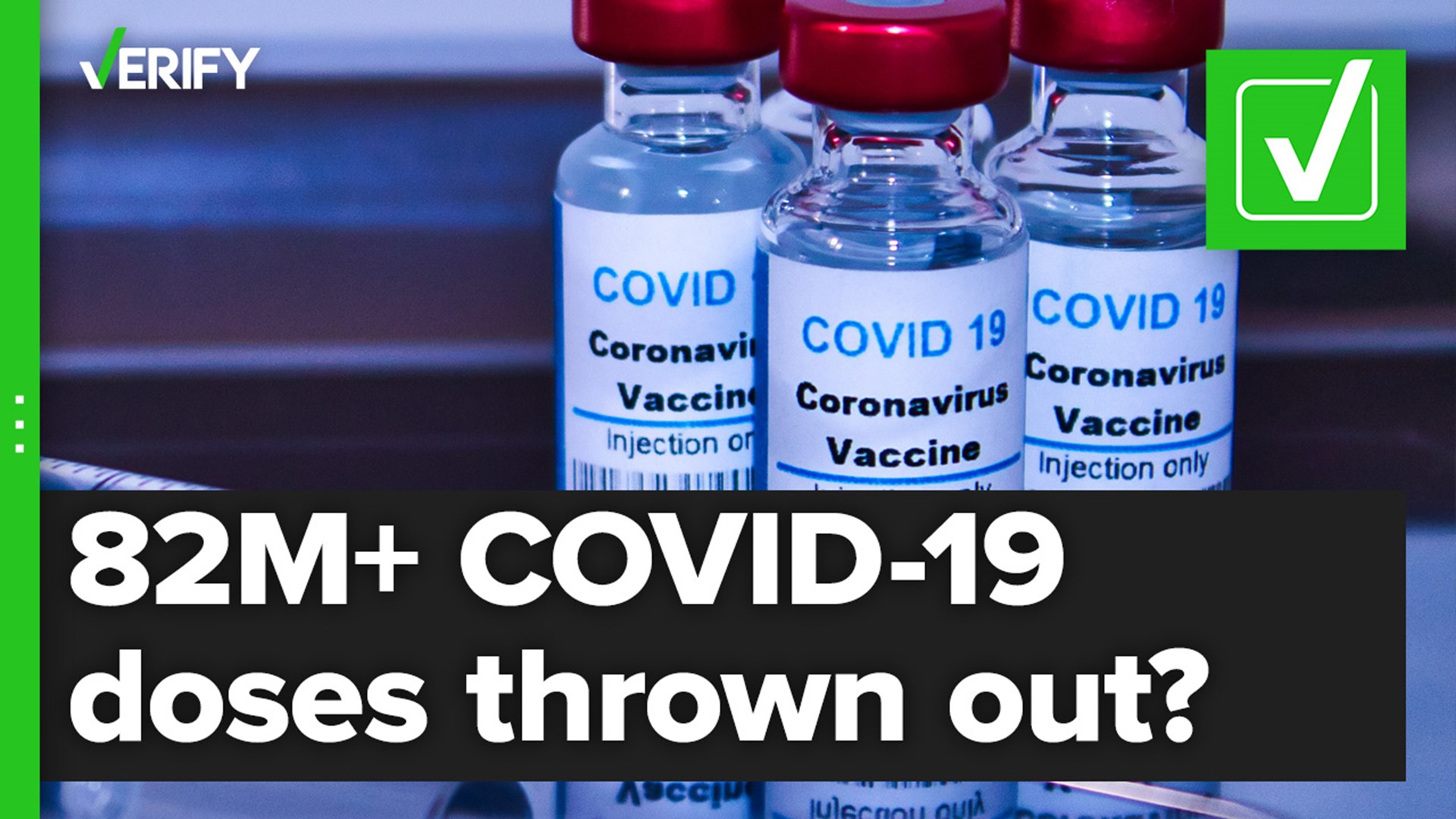SAN ANTONIO — Coronavirus hospitalizations in the San Antonio area are at their highest levels in nearly four months and health authorities tallied the community's first day of more than 1,000 new infections since February, a late-pandemic development that Metro Health officials say is consistence with national trends.
On Tuesday Metro Health reported a total of 1,656 new cases, far and away the highest single-day case count since Feb. 6, when the community was starting to recover from the omicron surge. June so far is averaging 585 new cases a day, more than double the 274 daily infections yielded in May.
The seven-day new case average, meanwhile, is up to 667—the highest that number has been since mid-February. Another resident has died of coronavirus complications, bringing Bexar County's death toll to 5,336.
There were 180 local patients receiving treatment at hospitals for their COVID-19 symptoms; of those, 28 are in intensive care and 10 are using ventilators to help them breathe. San Antonio-area hospitalizations are up 43% since June 1, and up 66% since May 1.
Meanwhile, San Antonio parents of young children can now make appointments to get their kids between 6 months and 5 years of age the vaccine, following approval by the FDA. They'll be available at Metro Health pop-up clinics starting Tuesday at Johnston Branch Library (6307 Sun Valley Dr.) from noon to 4 p.m., and at the Charles Boggess Center (12121 Loop 410 Access Rd.) from 5 p.m. to 7 p.m.
How Bexar County is trending




Vaccine Progress in Bexar County
The following numbers are provided by San Antonio Metro Health. A full breakdown can be found here.
- 1.456 million eligible Bexar County residents are fully vaccinated as of Monday, June 13.
- More than 550,000 eligible Bexar County residents have received their COVID-19 booster shot, including 73,881 residents who are fully boosted, as of Monday, June 13.
The CDC states that "when a high percentage of the community is immune to a disease (through vaccination and/or prior illness)," that community will have reached herd immunity, "making the spread of this disease from person to person unlikely."
The City of San Antonio breaks down the vaccination rates by zip code on Metro Health's Vaccination Statistics page.
Coronavirus in Texas
The total number of coronavirus cases in the state since the pandemic began grew by 18,761 on Tuesday, according to the Texas Department of State Health Services. That total includes 12,557 new confirmed cases and 6,204 new probable cases. More details can be found on this page.
Tuesday's figures bring the total number of Texans diagnosed with COVID-19 to more than 7 million.
An additional 10 Texans have died from virus complications, meanwhile, raising the statewide death toll to 86,981.
Coronavirus symptoms
The symptoms of coronavirus can be similar to the flu or a bad cold. Symptoms include fever or chills, cough, shortness of breath or difficulty breathing, fatigue, muscle or body aches, headache, new loss of taste or smell sore throat, congestion or runny nose, nausea or vomiting, and diarrhea, according to the Centers for Disease Control.
Most healthy people will have mild symptoms. A study of more than 72,000 patients by the Centers for Disease Control in China showed 80 percent of the cases there were mild.
But infections can cause pneumonia, severe acute respiratory syndrome, kidney failure, and even death, according to the World Health Organization. Older people with underlying health conditions are most at risk.
Experts determined there was consistent evidence these conditions increase a person's risk, regardless of age:
- Chronic kidney disease
- COPD (chronic obstructive pulmonary disease)
- Obesity (BMI of 30 or higher)
- Immunocompromised state (weakened immune system) from solid organ transplant
- Serious heart conditions, such as heart failure, coronary artery disease, or cardiomyopathies
- Sickle cell disease
- Type 2 diabetes
- The CDC believes symptoms may appear anywhere from two to 14 days after being exposed.
Human coronaviruses are usually spread...
- Between people who are in close contact with one another (within about 6 feet).
- Through respiratory droplets produced when an infected person coughs, sneezes or talks. These droplets can land in the mouths or noses of people who are nearby or possibly be inhaled into the lungs.
- Some recent studies have suggested that COVID-19 may be spread by people who are not showing symptoms.
Help stop the spread of coronavirus
- Stay home when you are sick.
- Eat and sleep separately from your family members
- Use different utensils and dishes
- Cover your cough or sneeze with your arm, not your hand.
- If you use a tissue, throw it in the trash.
Find a Testing Location
City officials recommend getting a COVID-19 test if you experience fever or chills, cough, shortness of breath or difficulty breathing, fatigue, muscle or body aches, headache, new loss of taste or smell, sore throat, congestion or runny nose, nausea or vomiting, or diarrhea.
Here's a Testing Sites Locator to help you find the testing location closest to you in San Antonio.
Latest Coronavirus Headlines
- North Korea reports another disease outbreak amid COVID-19 wave
- University Health finalizing plans to provide COVID-19 vaccines to children 5 years old and younger
- You tested positive for COVID-19 (or were exposed). Now what?
- Biden celebrates COVID shots for kids under 5
- Fauci, 81, tests positive for COVID-19
- Texas high school students slightly improve on some standardized tests; haven’t fully regained ground since the pandemic
- At-home COVID test results should be reported as cases rise, health officials say

